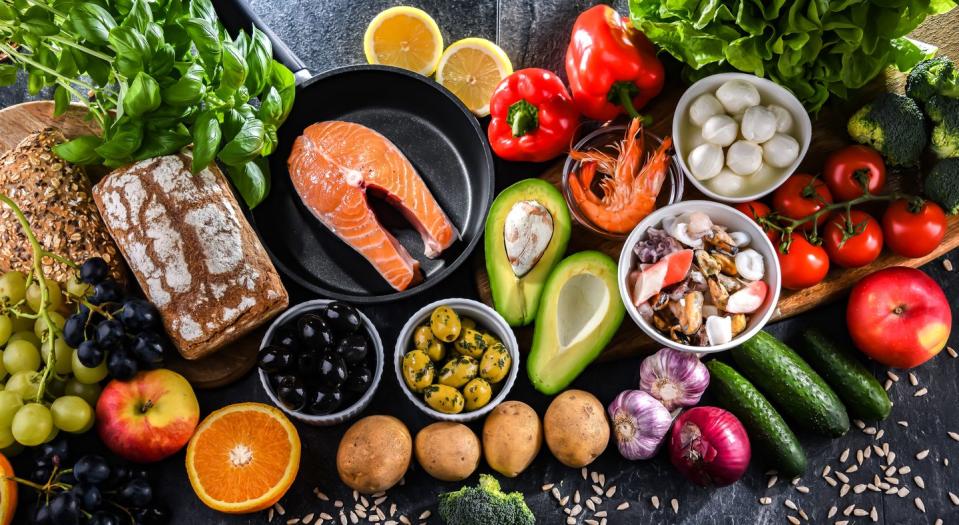Atlantic Diet Vs. Mediterranean Diet: Which Is Better For You?

"Hearst Magazines and Yahoo may earn commission or revenue on some items through these links."
The Mediterranean diet tells you to fill up your plate with healthy fats, fish, nuts, fruits, and veggies. It's considered by dietitians to be one of the healthiest ways you can eat. It’s heart-healthy, can help you lose weight, and, I mean, who doesn’t want to pretend like they’re on a never-ending vacation on the Mediterranean coast?
The Mediterranean diet isn’t going anywhere; it was just named the top diet again by U.S. News and World Report. But a newcomer called the Atlantic diet, which has a few key differences, is getting buzz following a study published this month in JAMA Network Open. The research suggests you don’t have to entirely rule out meat and potatoes in order to keep your waistline, cholesterol, and blood sugar levels in check.
The Atlantic diet comes from traditional eating patterns in the Northwestern Iberian Peninsula—specifically, northwestern Spain and northern Portugal, explains Kim Yawitz, R.D., a dietitian and gym owner in St. Louis.
“It’s been compared to the better-known Mediterranean diet, and for good reason,” she says. “Both diets encourage liberal consumption of fruits, vegetables, whole grains, legumes, olive oil, nuts, and fish and allow moderate wine consumption.”
The key difference is that the typical Atlantic diet allows for more beef and pork and tends to be more starch-heavy than the Mediterranean diet.
Here’s everything to know about the Atlantic diet, according to dietitians.

What Foods Can You Eat on the Atlantic Diet?
Local, fresh foods that are seasonal and minimally processed are the focus of an Atlantic diet.
Staples of the diet include fruits, vegetables, whole grain bread, potatoes (often served in stews), beans, olive oil, fish and other seafood, milk and cheese, as well as dried fruits, and nuts, especially chestnuts. The Atlantic diet also allows for moderate amounts of beef, pork, poultry, and wine.
Skip the fried foods, though: The regional cuisine is mostly grilled, broiled, baked, or stewed.
Stewing in particular is a method of slow-cooking that can help retain nutrients and enhance flavors, incorporating ingredients like seafood, lean meats, vegetables, and legumes and reflecting the culinary traditions of regions along the Atlantic coast, says Michelle Routhenstein, M.S. RD., C.D.N., a cardiology dietitian and owner of Entirely Nourished. You can use fresh herbs and spices to amp up the flavor in your stews, she says.

What Are the Pros of the Atlantic Diet?
The Atlantic diet is low in saturated fat and rich in antioxidants, vitamins, minerals, fiber, and healthy fats, points out Yawitz. In the 2024 study that involved 574 participants, those who followed the diet for six months saw significant improvements in waist circumference and HDL (i.e., good) cholesterol, she says.
Other recent studies, Yawitz points out, suggest the Atlantic diet may help reduce depression and boost longevity.
Routhenstein likes that the Atlantic diet focuses on seafood and healthy fats, such as those found in fish and olive oil. This can contribute to improved heart health and reduced risk of cardiovascular diseases.
A 2022 study in the Journal of the American College of Cardiology found that people who ate more than a half teaspoon of olive oil daily had lower rates of premature death from cardiovascular disease compared to those who never or rarely consumed the oil. Dietitians hail extra virgin olive oil as a healthy fat because it’s rich in antioxidants like oleocanthal, which is known to help fight inflammation. (Chronic inflammation is such a big concern because it’s linked to an array of health problems, including heart disease, diabetes, cancer, and more.)
Much like the Mediterranean diet, the health benefits of the Atlantic diet are largely good for long-term cognitive health, says dietitian Michelle Saari, R.D.N. at EHealth Project. Fresh seafood and olive oil are rich in omega-3 fats, a nutrient linked to brain function.
What Are the Cons of the Atlantic Diet?
While the aforementioned studies are promising, the Atlantic diet hasn’t been researched extensively, Yawitz says. This is surprising, given that Southern Europeans have been eating this way for centuries.
“Based on the available studies and given its similarities to the Mediterranean diet, the diet appears to be pretty healthy overall,” she says. “That said, the plan is just different enough from the Mediterranean diet to warrant further investigation.”
The diet might also pose some challenges for those who live in regions with limited access to fresh seafood, says Routhenstein. Also, some people struggle with constantly preparing fresh meals, and the Atlantic diet heavily encourages people to be cooking from scratch, Saari says.
Tips for Starting the Atlantic Diet
Starting a new plan can feel overwhelming, but you can ease into the Atlantic diet by making simple changes to your current diet.
For example, you might swap your white bread for whole grain, throw some fish on the grill instead of your usual strip steak, or order vegetable soup rather than broccoli cheddar, Yawitz suggests.
“The Atlantic diet is still relatively new on the diet scene so you won’t find many recipe books at your local bookstore,” she says. “You can search the internet for healthy Spanish or Portuguese recipes or look through Mediterranean diet cookbooks if you need inspiration.”
Here are a few more tips for starting the Atlantic diet, according to Saari:
Start with seafood: Try incorporating fish or shellfish into your meals a few times a week. Look for what's fresh and sustainable in your area. You can still have frozen seafood, as the nutrients are maintained.
Increase plant-based foods: Add more fruits, vegetables, and whole grains to your meals. Having half a plate of fruits and vegetables at all meals will improve your health. Experiment with legumes and nuts as snacks or meal components.
Use olive oil: Replace other fats with olive oil for cooking and dressings.
Eat dairy and meat in moderation: Opt for smaller portions of dairy and red meat, focusing instead on the plant-based aspects of the diet.
You Might Also Like

